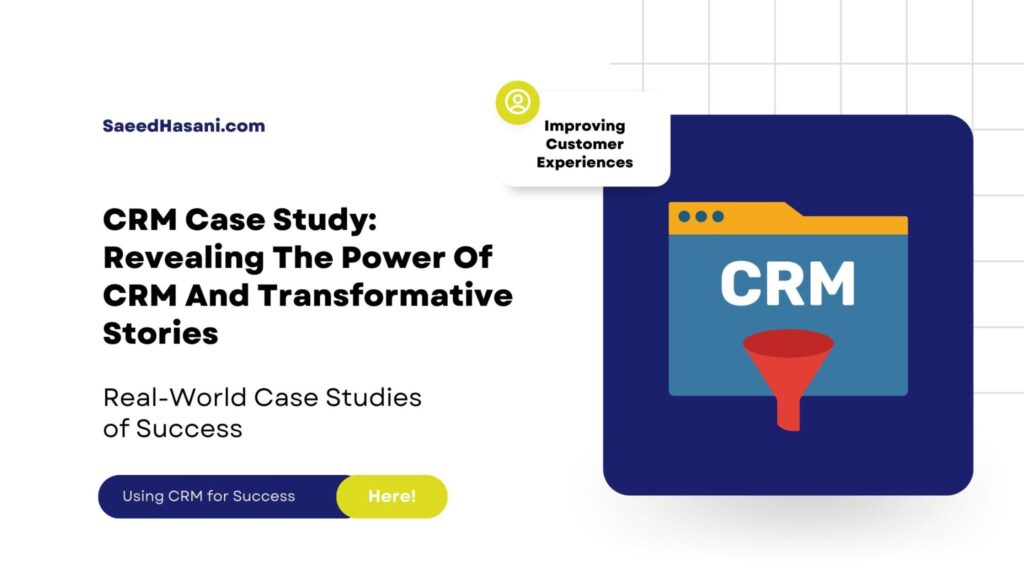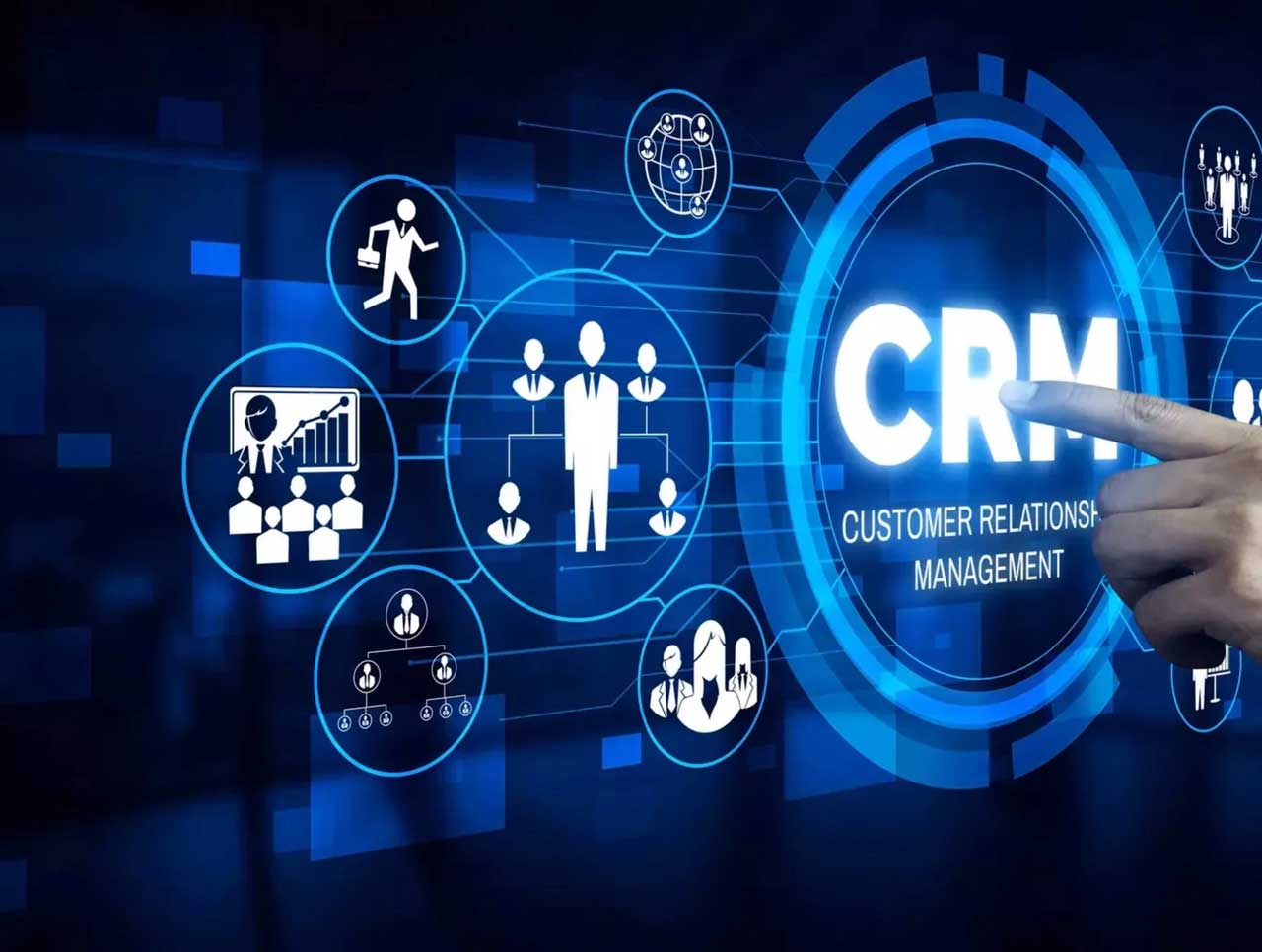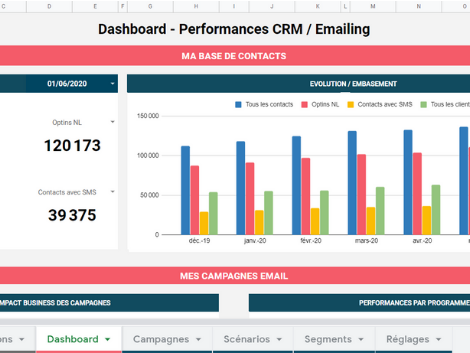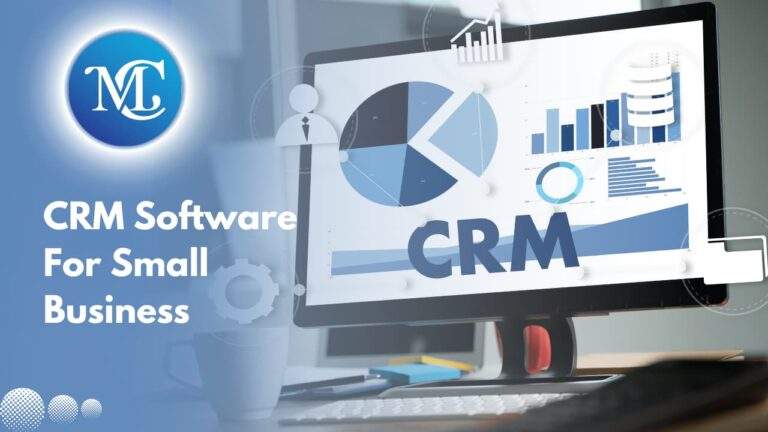
Introduction: The Power of CRM in Modern Marketing
In today’s hyper-competitive business landscape, simply having a great product or service isn’t enough. You need to connect with your customers, understand their needs, and build lasting relationships. This is where Customer Relationship Management (CRM) systems come into play. CRM isn’t just a piece of software; it’s a philosophy centered on putting the customer first. It’s about understanding their journey, anticipating their needs, and providing personalized experiences that keep them coming back for more.
This article delves into the heart of CRM marketing, showcasing real-world success stories. We’ll explore how businesses across various industries have harnessed the power of CRM to achieve remarkable results. These aren’t just isolated incidents; they represent a consistent pattern of success that can be replicated with the right strategy and execution. We’ll examine the strategies, the challenges, and the triumphs, providing you with actionable insights you can apply to your own marketing efforts.
What is CRM Marketing and Why Does it Matter?
Before we dive into the success stories, let’s briefly define CRM marketing. At its core, CRM marketing uses CRM systems to manage and analyze customer interactions and data throughout the customer lifecycle. This includes everything from initial contact to purchase and beyond. The goal? To understand customer behavior, personalize marketing efforts, improve customer satisfaction, and ultimately, drive revenue growth.
Here’s why CRM marketing is so crucial:
- Enhanced Customer Understanding: CRM systems provide a 360-degree view of your customers, allowing you to understand their preferences, behaviors, and needs.
- Personalized Marketing: With a deep understanding of your customers, you can tailor your marketing messages and offers to resonate with each individual, increasing engagement and conversion rates.
- Improved Customer Retention: By providing personalized experiences and proactively addressing customer concerns, CRM helps you build stronger customer relationships and reduce churn.
- Increased Sales: CRM systems streamline sales processes, improve lead qualification, and enable sales teams to close deals more efficiently.
- Better ROI: By optimizing marketing campaigns and improving sales performance, CRM ultimately leads to a higher return on investment (ROI).
Success Story 1: HubSpot – Transforming Marketing and Sales with CRM
HubSpot, a leading provider of inbound marketing and sales software, is a prime example of how CRM can revolutionize a business. HubSpot itself is a testament to the power of its own platform. They didn’t just build a CRM; they live and breathe it, using it to fuel their own growth and success.
The Challenge: HubSpot faced the challenge of scaling its marketing and sales efforts while maintaining a personalized approach to customer interactions. They needed a system that could handle a large volume of leads, track customer interactions, and provide insights to optimize their sales and marketing strategies.
The Solution: HubSpot implemented its own CRM platform, integrating it with its marketing automation tools, sales tools, and customer service software. This created a unified platform for managing the entire customer lifecycle. They utilized the CRM to:
- Track Lead Interactions: Monitor website visits, email opens, and social media engagement to understand lead behavior.
- Automate Marketing Campaigns: Create personalized email sequences, landing pages, and workflows based on lead behavior and preferences.
- Manage Sales Processes: Streamline the sales pipeline, track deals, and provide sales reps with the information they need to close deals.
- Provide Customer Service: Offer personalized support through a ticketing system and knowledge base.
The Results: HubSpot’s implementation of its own CRM platform resulted in significant improvements:
- Increased Lead Generation: By optimizing their marketing campaigns, HubSpot saw a significant increase in lead generation.
- Improved Conversion Rates: Personalized marketing efforts led to higher conversion rates and more sales.
- Enhanced Customer Satisfaction: By providing excellent customer service, HubSpot improved customer satisfaction and loyalty.
- Significant Revenue Growth: The combined impact of these improvements resulted in substantial revenue growth for HubSpot.
Key Takeaway: HubSpot’s success story highlights the importance of using CRM to create a unified view of the customer, personalize marketing efforts, and streamline sales processes. They understood that CRM is not just about technology; it’s about a customer-centric approach to business.
Success Story 2: Starbucks – Personalizing the Coffee Experience with CRM
Starbucks, the global coffee giant, is renowned for its customer-centric approach. Their success is not just about the coffee; it’s about the experience. And a key component of that experience is their sophisticated CRM system.
The Challenge: Starbucks needed a way to personalize the customer experience across its global network of stores. They wanted to reward loyal customers, understand their preferences, and tailor their marketing efforts to drive repeat business.
The Solution: Starbucks implemented a comprehensive CRM program that included a loyalty program (Starbucks Rewards), a mobile app, and data analytics. This allowed them to:
- Collect Customer Data: Track customer purchases, preferences, and interactions through the Starbucks Rewards program and mobile app.
- Personalize Offers: Offer personalized promotions and rewards based on customer purchase history and preferences.
- Improve Customer Engagement: Use the mobile app to allow customers to order ahead, pay, and earn rewards.
- Gather Customer Feedback: Collect customer feedback through surveys and the mobile app to improve their products and services.
The Results: Starbucks’ CRM initiatives have yielded impressive results:
- Increased Customer Loyalty: The Starbucks Rewards program has fostered significant customer loyalty and repeat business.
- Higher Average Order Value: Personalized offers and promotions have increased the average order value.
- Improved Customer Satisfaction: By providing a convenient and personalized experience, Starbucks has improved customer satisfaction.
- Significant Revenue Growth: The combined impact of these improvements has driven significant revenue growth for Starbucks.
Key Takeaway: Starbucks’ success story underscores the importance of using CRM to personalize the customer experience, reward loyalty, and drive repeat business. They understand that building strong customer relationships is key to long-term success.
Success Story 3: Amazon – Mastering Customer Personalization with CRM
Amazon, the e-commerce behemoth, is a master of customer personalization. Their CRM strategy is built on a foundation of data, analytics, and a relentless focus on the customer experience.
The Challenge: Amazon needed to personalize the shopping experience for millions of customers, understand their preferences, and recommend relevant products to drive sales.
The Solution: Amazon implemented a sophisticated CRM system that leverages vast amounts of customer data, including purchase history, browsing behavior, and search queries. They use this data to:
- Recommend Products: Provide personalized product recommendations based on customer preferences and purchase history.
- Personalize Email Marketing: Send targeted emails with relevant product suggestions, promotions, and updates.
- Optimize Website Experience: Customize the website experience based on customer behavior and preferences.
- Provide Personalized Customer Service: Offer personalized support based on customer purchase history and interactions.
The Results: Amazon’s CRM strategy has been a key driver of its success:
- Increased Sales: Personalized product recommendations and marketing campaigns have significantly increased sales.
- Improved Customer Engagement: Personalized experiences have improved customer engagement and loyalty.
- Enhanced Customer Satisfaction: By providing a convenient and personalized shopping experience, Amazon has improved customer satisfaction.
- Dominant Market Position: Amazon’s CRM strategy has helped it maintain its dominant market position in the e-commerce industry.
Key Takeaway: Amazon’s success story highlights the power of using data and analytics to personalize the customer experience and drive sales. They understand that understanding customer behavior and providing relevant recommendations is key to long-term success.
Success Story 4: Tesla – Building Brand Loyalty Through CRM and Customer Service
Tesla, the electric vehicle manufacturer, has built a cult following, and their CRM strategy plays a significant role in fostering that loyalty. Their approach goes beyond just selling cars; it’s about creating a community and providing exceptional customer service.
The Challenge: Tesla needed to build a strong brand reputation, provide exceptional customer service, and manage a growing base of customers in a rapidly evolving market.
The Solution: Tesla uses its CRM system to:
- Manage Customer Interactions: Track all customer interactions, from initial inquiries to service requests.
- Provide Personalized Service: Offer personalized support and service based on customer needs and vehicle history.
- Gather Customer Feedback: Collect customer feedback to improve products and services.
- Build a Community: Engage with customers through online forums and social media channels to build a sense of community.
The Results: Tesla’s CRM strategy has contributed significantly to its success:
- Strong Brand Loyalty: Exceptional customer service and a sense of community have fostered strong brand loyalty.
- Positive Word-of-Mouth Marketing: Satisfied customers have become brand advocates, generating positive word-of-mouth marketing.
- Improved Customer Satisfaction: Personalized service and support have improved customer satisfaction.
- Rapid Growth: Tesla has experienced rapid growth, fueled by strong brand loyalty and positive customer experiences.
Key Takeaway: Tesla’s success story demonstrates the importance of using CRM to build a strong brand reputation, provide exceptional customer service, and foster a sense of community. They understand that building strong customer relationships is crucial in a competitive market.
Success Story 5: Netflix – Recommending and Retaining with CRM
Netflix, the streaming giant, thrives on keeping its subscribers engaged and entertained. Their CRM strategy is deeply intertwined with their recommendation engine, which drives user engagement and retention.
The Challenge: Netflix needed to keep its subscribers engaged and prevent churn in a competitive streaming market. They needed to recommend relevant content and personalize the user experience.
The Solution: Netflix’s CRM strategy focuses on:
- Analyzing Viewing Data: Tracking user viewing history, preferences, and ratings.
- Personalizing Recommendations: Recommending movies and shows based on individual viewing habits.
- Customizing the User Interface: Personalizing the user interface with tailored content suggestions and categories.
- Targeted Marketing: Sending personalized emails and notifications to promote new content and keep subscribers engaged.
The Results: Netflix’s CRM-driven approach has yielded significant results:
- High User Engagement: Personalized recommendations keep users engaged and watching content.
- Low Churn Rates: By keeping users engaged with relevant content, Netflix reduces churn.
- Subscriber Growth: Strong retention and word-of-mouth contribute to subscriber growth.
- Market Dominance: Netflix has maintained its market dominance in the streaming industry.
Key Takeaway: Netflix’s success story emphasizes the power of using CRM to personalize the user experience, drive engagement, and retain customers. They understand that understanding user preferences and providing tailored content is key to long-term success.
Key Strategies for CRM Marketing Success
The success stories we’ve explored share several common threads. To replicate these results, consider these key strategies:
- Choose the Right CRM System: Select a CRM system that fits your specific needs and business goals. Consider factors like scalability, integration capabilities, and ease of use.
- Define Your Customer Journey: Map out the customer journey from initial contact to purchase and beyond. Identify touchpoints and opportunities to personalize the experience.
- Collect and Analyze Customer Data: Gather data on customer behavior, preferences, and interactions. Use this data to gain insights and inform your marketing efforts.
- Segment Your Audience: Divide your customers into segments based on their characteristics and behaviors. This allows you to tailor your marketing messages and offers to specific groups.
- Personalize Your Marketing: Use customer data to personalize your marketing messages, offers, and website experiences.
- Automate Your Marketing: Use marketing automation tools to streamline your marketing processes and deliver personalized experiences at scale.
- Integrate CRM with Other Systems: Integrate your CRM system with other systems, such as your marketing automation platform, sales tools, and customer service software, to create a unified view of the customer.
- Measure and Analyze Results: Track key performance indicators (KPIs) to measure the effectiveness of your CRM marketing efforts. Analyze the results and make adjustments as needed.
- Focus on Customer Service: Provide excellent customer service to build strong customer relationships and foster loyalty.
- Continuously Improve: CRM is not a one-time project; it’s an ongoing process. Continuously evaluate your CRM strategy and make improvements to optimize your results.
Challenges and How to Overcome Them
While CRM offers significant benefits, businesses often face challenges when implementing and managing a CRM system. Here’s how to overcome some common hurdles:
- Data Silos: Data silos can prevent you from getting a complete view of your customers. Integrate your CRM system with other systems to eliminate data silos.
- Data Quality: Inaccurate or incomplete data can undermine your CRM efforts. Implement data cleansing and validation processes to ensure data quality.
- User Adoption: If your employees don’t use the CRM system, it won’t be effective. Provide training and support to encourage user adoption.
- Lack of Integration: If your CRM system is not integrated with other systems, you may not be able to get a complete view of your customers. Integrate your CRM system with other systems to create a unified platform.
- Poor Strategy: Without a clear CRM strategy, your efforts may be unfocused and ineffective. Develop a well-defined CRM strategy that aligns with your business goals.
- Resistance to Change: Implementing a CRM system can require significant changes in your business processes. Manage change effectively by communicating the benefits of the new system and providing support to your employees.
The Future of CRM Marketing
The future of CRM marketing is bright, with several emerging trends shaping the landscape:
- Artificial Intelligence (AI): AI is being used to automate marketing tasks, personalize customer experiences, and provide valuable insights.
- Machine Learning (ML): ML algorithms are used to predict customer behavior, identify potential customers, and optimize marketing campaigns.
- Hyper-Personalization: Businesses are using data to deliver highly personalized experiences that meet individual customer needs.
- Omnichannel Marketing: Businesses are using multiple channels to engage with customers and provide a seamless experience across all touchpoints.
- Privacy and Data Security: With increasing concerns about data privacy, businesses are prioritizing data security and transparency.
Conclusion: Embrace CRM for Sustainable Growth
The success stories we’ve explored demonstrate the transformative power of CRM marketing. By implementing the right CRM strategy, businesses can build stronger customer relationships, personalize marketing efforts, improve customer satisfaction, and drive revenue growth. Remember, CRM is not just about technology; it’s about putting the customer first and building a customer-centric culture.
As you embark on your CRM journey, learn from the successes of others. Choose the right CRM system, define your customer journey, collect and analyze customer data, personalize your marketing, and continuously improve your efforts. Embrace the future of CRM marketing, and you’ll be well on your way to sustainable growth and success.
The key takeaway is that CRM marketing is not a one-size-fits-all solution. It requires a tailored approach that considers your specific business goals and customer needs. By focusing on building strong customer relationships and providing personalized experiences, you can unlock the full potential of CRM and achieve remarkable results.


